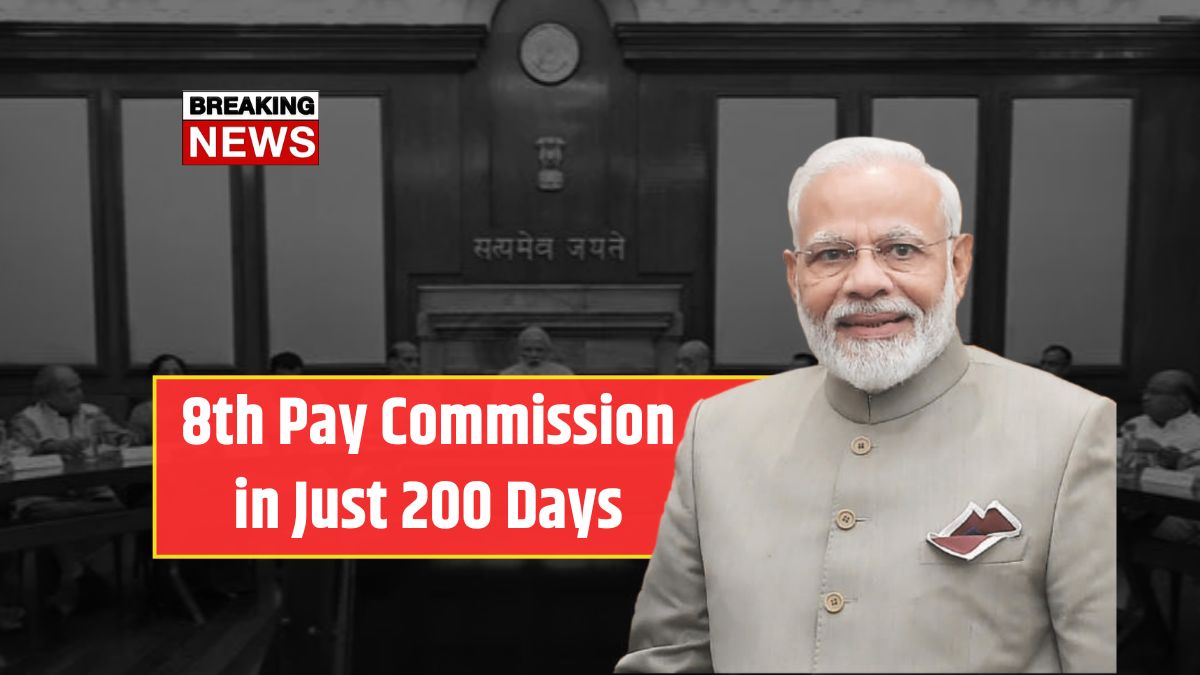8th Pay Commission – There’s some exciting buzz going around for central government employees and pensioners. Reports suggest that the Modi government is planning to roll out the much-awaited 8th Pay Commission in record time just 200 days. If this actually happens, it would be the fastest pay revision in India’s history.
With general elections not too far off and growing demands from employees and unions, this move could change the game in terms of salary structures and employee morale. Let’s break it down and see what it could mean for everyone involved.
What Exactly Is the 8th Pay Commission?
The 8th Pay Commission is expected to be a government-appointed panel that will review current salary structures and recommend revisions for central government staff and pensioners. These pay commissions are formed roughly every ten years to help align salaries with inflation, cost of living, and economic realities.
This new commission would take a close look at current pay bands, allowances, pension rules, and even promotion-related guidelines to ensure government employees are being compensated fairly.
Why the Sudden Rush for Implementation?
Usually, setting up a pay commission and implementing its recommendations is a long process. But this time, the government appears to be fast-tracking things. Why? A few reasons stand out.
One, the general elections are just around the corner. Two, employee unions have been consistently asking for a quick revision, especially with inflation pinching pockets harder than ever. Plus, sectors like defence and railways have been vocal about the need for better pay structures.
Also Read:
 Indian Railways Tatkal Rules: Indian Railways’ New Rule Creates Chaos! Tatkal & Waitlist Hit Hard
Indian Railways Tatkal Rules: Indian Railways’ New Rule Creates Chaos! Tatkal & Waitlist Hit Hard
So, there’s both political and practical pressure to move fast – and 200 days seems to be the unofficial deadline the government is working with.
Who All Will Benefit?
If you’re wondering who stands to gain from this, the answer is a lot of people. The direct beneficiaries would include over 50 lakh central government employees and around 60 lakh pensioners. Some public sector employees and staff in central universities and institutions might also be covered depending on the scope.
This would include:
- Government clerks, officers, and staff
- Defence personnel and armed forces
- Retired government servants
- Employees in some central PSUs
- Teachers and non-teaching staff in central bodies
Expected Changes in Salaries
Although official numbers haven’t been shared yet, early estimates indicate a decent jump in salaries. For instance, those in the lowest pay bracket, earning a basic pay of around eighteen thousand, could see that rise to about twenty-six thousand. That’s roughly a forty percent hike.
For mid-level officers, the jump could be between twenty-five to thirty-five percent. And for higher-level officers, while the percentage increase may be slightly lower, the absolute jump in rupees will still be significant.
These expected increases are based on inflation trends and adjustments from past commissions. The final numbers will depend on the recommendations made by the committee once it is formed.
Impact on Pensioners and Gratuity
The 8th Pay Commission is not just about salary hikes. Pensioners are also in line for a solid boost. Their monthly pension amounts could go up significantly, and some changes in medical reimbursements, gratuity limits, and retirement benefits are also being considered.
There is speculation that the gratuity cap might be raised from twenty lakh to twenty-five lakh, giving more financial security to retiring employees.
What’s the Likely Timeline?
If everything goes according to plan, here’s how the process might unfold:
- An official announcement could be made in the next month or two
- A committee might be formed within a few weeks after that
- Recommendations could be submitted in four to five months
- Cabinet review and final approval may come by the end of the 200-day window
If this schedule is followed, the 8th Pay Commission might be up and running by the end of this year or early next year, which is much faster than earlier pay commissions.
What Challenges Lie Ahead?
While the idea of a quick rollout is great, there are some real challenges to consider. One big concern is the financial impact on the government. A hike in salaries and pensions means a higher burden on the central budget, which could lead to tough decisions on other fronts.
There’s also a possibility of inflation going up if too much money enters the system at once. Plus, state government employees might feel left out if their salaries are not revised in sync.
If the Modi government actually manages to implement the 8th Pay Commission within 200 days, it will be a historic move. It could bring genuine financial relief to lakhs of families and restore some long-overdue balance in the government salary structure.
But for now, it’s still in the planning stage. So, while the hopes are high, we’ll have to wait for official confirmation before getting too excited. Still, for government employees and pensioners, this could be a sign of better days ahead.






